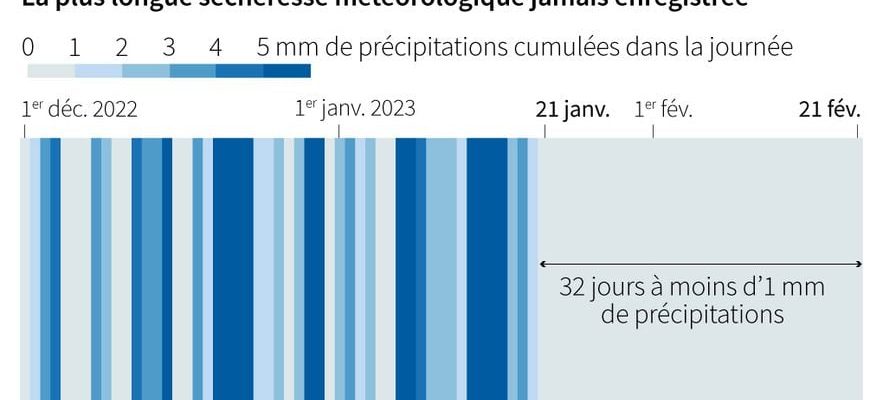COP 28 is over, the end of December is approaching and it is time to take stock. The year 2023 was marked by heat records, on land and at sea, reaching the Arctic where the melting of the Greenland ice cap continues at a high rate.
In France, the summer of 2023 was less devastating than the previous one, but it was to hit better in September. Globally, it was the hottest month ever measured. Meanwhile, demand for oil is expected to reach a new record in 2024 while humans have never consumed so much coal. The planet will have suffocated again in 2023.
2023, the hottest year in history
Confirmation has come: the year 2023 will be the hottest in history, after an “extraordinary” November which became the sixth consecutive month to break records, the European Copernicus service declared on Wednesday December 6, while climate negotiations were in full swing at COP 28.
Global warming was illustrated by the extraordinary temperatures of the month of September, which “beyond comprehension” even if they turned out to be in line with the forecasts of climatologists, the director of the service on climate commented to AFP in early October. climate change from the European Copernicus Observatory, Carlo Buontempo. With an average temperature of 16.38°C on the surface of the globe, the past month of September is an “unprecedented anomaly”, surpassing the September 2020 record by a surprising 0.5°C.
Drought: 32 consecutive days without rain in France
2023 is also the year of drought in mainland France, which did not experience real rain for 32 days, from January 21 to February 21. Over this period, the cumulative precipitation aggregated over the metropolis was less than 1 mm every day, i.e. “the longest series since the beginning of measurements in 1959”, indicated the public body.
France has experienced more than 30 days without rain in 2023.
© / afp
The episode was all the more worrying as it occurred in winter, a crucial period for groundwater recharge, especially in a context of chronic precipitation deficit since August 2021 and after an exceptional drought and heatwaves in 2022. This consecutive series now exceeds that of the year 2020, which occurred for 31 days between March 17 and April 16, in the middle of the first Covid-19 confinement.
Arctic, Antarctica:
The summer of 2023 was the hottest on record in the Arctic, according to a benchmark report published Tuesday, December 12, which paints an alarming picture of this region of the world. Last year (October 2022 to September 2023) was the sixth warmest since 1900 in the Arctic. But summer (July to September) broke a record there, with an average temperature of 6.4°C. This region which includes the North Pole is affected by a phenomenon called “amplification”, that is to say that it warms more quickly than the mid-latitudes. This mechanism is linked to many factors, such as the loss of snow cover and sea ice or even the warming of the oceans.
The Antarctic ice shelf has reached its maximum surface area for the year… And it has never been so small since the beginning of scientific surveys, the American reference observatory announced in September. The Antarctic sea ice melts in summer and replenishes in winter, which is now ending in the southern hemisphere.
Ever warmer oceans
The oceans broke a new world heat record in August 2023, raising fears of harmful consequences for marine life and for climate balances. The surface temperature of the oceans “reached 20.96 °C on July 30” 2023, according to the ERA5 database, while “the previous record was 20.95 °C in March 2016”, according to a door -spokesperson for the European Copernicus service. These data concern the oceans between the 60th parallels north and south, therefore excluding only the polar regions.
In June 2023, the Atlantic Ocean experienced a marine heatwave for several days, a phenomenon decreed when the water surface temperature is higher than normal for at least five days. And these marine heatwaves are, unsurprisingly, an effect of climate change: the oceans absorb 90% of the heat generated by the greenhouse effect, which contributes to increasing their temperatures. Ocean currents can also create areas of warm water.
The planet has never consumed so much coal
The planet has never consumed so much coal: in 2023, global demand will reach 8.53 billion tonnes. A historic record mainly due to a sharp increase in consumption in China, India and Indonesia, the International Energy Agency (IEA) indicated this Friday, December 15. Note that the combustion of coal to produce energy or in industry emits into the atmosphere a large part of the CO2 responsible for global climate change. From 2024, “global coal consumption should begin a downward trend”, however, estimated the IEA in its forecasts.
The trend is also upward for oil. Black gold will experience “healthy” growth towards a new record in 2024, estimated the Organization of the Petroleum Exporting Countries (OPEC) in its monthly report, published Wednesday December 13. Next year, the world will consume an average of 104.36 million barrels of oil per day, up from 102.11 in 2023. Rising demand is “supported by resilient global GDP growth” amid better economic situation in China, explains OPEC.
